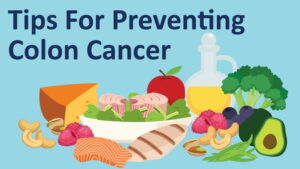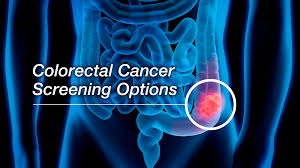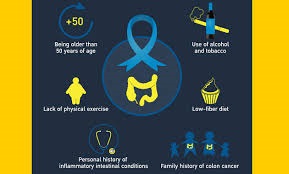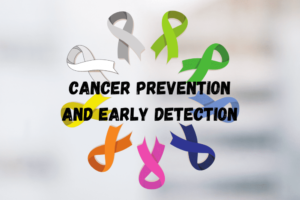PREVENTING COLON CANCER

Colon cancer, also known as colorectal cancer, is a major health concern worldwide. However, there are several effective strategies for reducing the risk of developing this disease. Emphasizing the importance of a healthy diet, regular exercise, and maintaining a healthy weight is crucial for prevention. Additionally, understanding the role of screening programs and promoting awareness of colorectal cancer risk factors are essential for early detection and effective risk reduction. In this article, we will delve into these key areas to provide comprehensive guidance on colon cancer prevention and risk reduction.
THE IMPORTANCE OF A HEALTHY DIET IN REDUCING THE RISK OF COLON CANCER

A balanced and nutritious diet plays a fundamental role in reducing the risk of colorectal cancer. Certain dietary patterns and food choices can significantly impact colon health and overall well-being.
Consuming a Diet Rich in Fruits and Vegetables:
First and foremost, incorporating a variety of fruits and vegetables into your daily diet is vital. These foods are rich in vitamins, minerals, and antioxidants, which can help protect cells from damage and reduce inflammation. According to the American Cancer Society (2023), a diet high in fruits and vegetables is associated with a lower risk of colorectal cancer. Specifically, vegetables like broccoli, cauliflower, and kale, and fruits such as berries and citrus fruits, offer protective benefits due to their high fibre content and phytochemicals.
Including Whole Grains:
Whole grains are another essential component of a cancer-preventive diet. Unlike refined grains, whole grains retain their fibre, vitamins, and minerals. Foods like brown rice, oatmeal, and whole wheat bread can contribute to better digestive health and lower cancer risk. The fibre in whole grains helps regulate bowel movements and may reduce the risk of colorectal cancer by improving gut health and preventing constipation.
Limiting Red and Processed Meats:
Conversely, reducing the consumption of red and processed meats is crucial. Studies have shown that high intake of red meat (such as beef and pork) and processed meats (like bacon and sausages) is linked to an increased risk of colon cancer. This association may be due to the presence of certain chemicals and compounds formed during the cooking process or the processing of these meats. Therefore, limiting these foods and opting for lean proteins, such as poultry and fish, can be beneficial for cancer prevention.
Reducing Alcohol Consumption
Alcohol consumption is another factor to consider. Excessive alcohol intake has been linked to a higher risk of colon cancer. The American Cancer Society recommends limiting alcohol to no more than one drink per day for women and two drinks per day for men. This moderation can help reduce cancer risk and promote overall health.
THE ROLE OF REGULAR EXERCISE IN REDUCING THE RISK OF COLON CANCER

Regular physical activity is an important aspect of maintaining overall health and reducing the risk of colorectal cancer. Exercise helps regulate weight, improves digestion, and enhances overall well-being.
Engaging in Regular Physical Activity:
Regular exercise has been shown to lower the risk of colon cancer by promoting healthy digestion and reducing inflammation. The American Cancer Society suggests engaging in at least 150 minutes of moderate-intensity aerobic activity or 75 minutes of vigorous-intensity activity per week, along with muscle-strengthening activities on two or more days per week (American Cancer Society, 2023). Activities such as walking, cycling, and swimming are excellent options for maintaining physical fitness and supporting colon health.
Maintaining a Healthy Weight:
Maintaining a healthy weight is closely linked to colon cancer risk. Obesity, especially abdominal obesity, has been associated with an increased risk of developing colon cancer. Excess body fat can lead to inflammation and hormone imbalances, which may contribute to cancer development. Therefore, combining regular exercise with a balanced diet is essential for achieving and maintaining a healthy weight.
UNDERSTANDING THE ROLE OF SCREENING PROGRAMS IN PREVENTING COLON CANCER

Screening programs are crucial in preventing colon cancer and detecting it at an early stage when treatment is most effective. Regular screening can help identify precancerous conditions or early-stage cancer before symptoms arise.
Types of Colon Cancer Screenings
Several screening methods are available, each with its own benefits. The main screening options include:
- Colonoscopy: This is the most comprehensive screening method, allowing for the examination of the entire colon and rectum. During the procedure, a flexible tube with a camera is inserted through the rectum to inspect the colon lining. Colonoscopy can also remove precancerous polyps for further examination. The U.S. Preventive Services Task Force (USPSTF) recommends starting regular colonoscopy screenings at age 45 for individuals at average risk (USPSTF, 2022).
- Sigmoidoscopy: This test examines only the lower part of the colon and rectum. It is less invasive than a full colonoscopy but may require follow-up colonoscopy if abnormalities are detected. Sigmoidoscopy is generally recommended every five years, often combined with stool tests.
- Stool Tests: These non-invasive tests detect hidden blood or genetic markers in stool samples. Options include the fecal immunochemical test (FIT), the fecal occult blood test (FOBT), and stool DNA tests like Cologuard. Stool tests are usually performed annually or every three years, depending on the specific test.
ADHERENCE TO SCREENING GUIDELINES FOR EARLY DETECTION OF COLON CANCER
Following recommended screening guidelines is essential for early detection and prevention. The American Cancer Society and other health organizations emphasize the importance of regular screenings, particularly for individuals at higher risk, such as those with a family history of colorectal cancer or other risk factors. Adhering to these guidelines can lead to the timely identification and removal of precancerous conditions, thereby reducing the likelihood of developing colon cancer.
PROMOTING AWARENESS OF COLON CANCER RISK FACTORS

Awareness of risk factors is key to colon cancer prevention and early detection. Understanding these risk factors allows individuals to take proactive steps to reduce their risk and seek early screening.
Family History and Genetic Factors:
Family history plays a significant role in colon cancer risk. Individuals with a family history of colon cancer or related conditions, such as Lynch syndrome or familial adenomatous polyposis (FAP), are at an increased risk. Genetic testing and counseling can help identify those at higher risk and guide appropriate screening and preventive measures.
Age and Lifestyle Factors:
Age is another important factor; the risk of colon cancer increases with age, particularly after 45. Additionally, lifestyle factors such as smoking, excessive alcohol consumption, and a sedentary lifestyle can contribute to an increased risk of colon cancer. Adopting a healthy lifestyle that includes regular exercise, a balanced diet, and avoiding tobacco and excessive alcohol can help mitigate these risks.
Chronic Conditions:
Certain chronic conditions, such as inflammatory bowel disease (IBD), including Crohn’s disease and ulcerative colitis, also elevate the risk of colon cancer. Regular monitoring and management of these conditions are essential for reducing cancer risk. Patients with IBD should follow their healthcare provider’s recommendations for surveillance and screening.
ENCOURAGING EARLY DETECTION AND PREVENTION OF COLON CANCER

Encouraging early detection and prevention requires a multifaceted approach that includes education, awareness, and access to healthcare resources.
Education and Awareness Campaigns:
Education and awareness campaigns play a critical role in promoting colon cancer prevention and early detection. Public health initiatives and cancer organizations work to raise awareness about the importance of a healthy lifestyle, regular screenings, and understanding risk factors. Engaging in these campaigns can help increase knowledge and encourage individuals to take proactive steps in their health.
Access to Healthcare Resources:
Access to healthcare resources is essential for effective colon cancer prevention and early detection. Ensuring that individuals have access to screening programs, medical care, and preventive services is vital. Healthcare providers and community organizations can offer resources and support to help individuals navigate the healthcare system and access necessary screenings and treatments.
Personal Responsibility and Advocacy:
Taking personal responsibility for one’s health and advocating for regular screenings and preventive measures can significantly impact colon cancer outcomes. Individuals should be proactive in discussing their risk factors and screening options with their healthcare providers. Additionally, advocating for increased awareness and support for colon cancer prevention can contribute to broader public health efforts.
CONCLUSION.
In conclusion, colon cancer prevention and risk reduction involve a combination of healthy lifestyle choices, regular screenings, and awareness of risk factors. Emphasizing the importance of a healthy diet, regular exercise, and maintaining a healthy weight can significantly reduce the risk of colon cancer. Additionally, understanding the role of screening programs and promoting awareness of risk factors are crucial for early detection and effective prevention.
By adopting these strategies and seeking appropriate support, individuals can take proactive steps to reduce their risk of colon cancer and improve their overall health. For more information and resources on colon cancer prevention and early detection, refer to reputable organizations such as the American Cancer Society (2023) and the U.S. Preventive Services Task Force (2022).
REFERENCES:
American Cancer Society. (2023). Colorectal Cancer Prevention and Early Detection. Retrieved from American Cancer Society
U.S. Preventive Services Task Force. (2022). Colorectal Cancer Screening. Retrieved from USPSTF